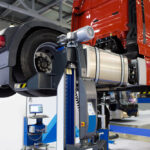
The Need for Speed: Exploring the Fastest Semi-Trucks in the World
April 17, 2024
5 Programs & Services Fleet Managers Should Try
May 31, 2024Recently updated on August 12th, 2024
At LubeZone, we offer a wide range of services for semi-truck owners and operators that include ongoing preventative maintenance. We pride ourselves on flexible scheduling and quick turnaround time, but the best way to make sure that your vehicle gets the care that it needs is to develop a preventative maintenance schedule at your local LubeZone location.
When you have a set preventative maintenance plan with LubeZone, you can enjoy countless benefits including things like improved fuel economy, fewer unplanned trips to the mechanic, greater reliability, and more.
Semi-trucks need preventative maintenance just like any other car or truck. By doing regular checkups and repairs, you can make sure that your truck is running well and won’t have any problems on the road. This will save you time and money in the long run.
Preventative Maintenance Checklist For Semi-Truck Drivers
Following a preventative maintenance schedule for your truck is essential to keeping it in good condition and prolonging its lifespan. By taking the time to do these simple checks on a regular basis, you can avoid costly repairs down the road and keep your truck running smoothly for years to come.
The following checks are important for any vehicle, but the time between checks will vary depending on your specific situation. When you connect with the experts at LubeZone to come up with an ongoing preventative maintenance plan, we will take all of these factors into account to create a schedule that works best for you.
Take a look below to get a better idea of how to take care of your vehicle, and contact us right away to make preventative maintenance an effortless part of your work.
Tire Checks
A tire check includes inspecting the tread depth, looking for any cuts or cracks in the sidewalls, and checking the air pressure. Not all tire blowouts can be avoided, but any additional step to avoid this dangerous situation on the road will help improve your safety — and everyone you share the road with.
Grease and Oil Changes
Oil changes are important for keeping your engine running smoothly. By partnering with LubeZone, you can be confident that this important check will be included in the preventative maintenance schedule that we build for your vehicle.
Fluid Levels
Check the power steering and transmission fluid. Engine oil, transmission fluid, power steering fluid, and coolant levels should all be checked on a regular basis according to your driving habits and maintenance schedule.
Air Filters
By keeping your air filters fresh in your semi-truck, you improve airflow to the engine, which helps it to run more efficiently. Change or replace as needed (depending on the type of vehicle driven).
Battery Checks
Checking the health and strength of your battery is an important part of preventative maintenance to ensure that your truck can start quickly and easily in all types of weather and that your battery-operated auxiliary accessories can function when you need them most.
Coolant Level Check
These checks are essential for any semi-truck preventative maintenance schedule. Do these checks monthly, and be sure to mix the coolant according to the manufacturer’s specifications if you need to top off your radiator.
Hose Check
Check all hoses for leaks, cracks, or fraying. Give special attention to all radiator and heater hoses because a break in one of these could leave you stranded on the side of the road waiting for a heavy tow and may even cause damage to the components that the hose was connected to.
Belt Check
All belts should be tightened to the proper tension as indicated in your truck’s owner’s manual. If you notice any squealing or squeaking coming from your engine bay, this could be a sign that your belts are either loose or fraying. A broken belt can cause major disruptions to your trucking schedule.
Lights Check
All lights should be clean and functioning properly, including headlights, brake lights, turn signals, and emergency flashers. There is nothing more frustrating than learning about a malfunctioning or burned-out bulb when you get pulled over by highway patrol and cited for an infraction.
Windshield Wipers Check
Wiper blades should be in good condition with no cracks or wear; washer fluid levels should be full. It is common for people to forget that they need new wipers until it starts raining, which is why including this review in your preventative maintenance schedule is so important.
Brakes Check
A brake check includes both the truck and trailer brakes. Perform a regular visual check of brake drums/discs, calipers, hoses, and lines for leaks, cracks, or wear. Be sure to check that the parking brake is fully functional, as well.
Suspension Check
Suspension is a low-maintenance aspect of your semi-truck but important regardless. When inspecting your suspension, look for any signs of wear or damage in the shock absorbers, springs, U-bolts, hangers, and equalizers. Faulty or degraded suspension can lead to all sorts of issues, including damage to your cargo.
Wheel Alignment Check
On a passenger vehicle, alignments are typically performed yearly; however, on a high-use vehicle like a semi-truck, it is important to check your alignment every 2-3 months, depending on your average mileage. We will plan these checks into your maintenance schedule depending on your unique use case.
Exhaust System Check
Look for any cracks or holes in the exhaust pipes, muffler, or DEF system. Also, check for proper operation of the exhaust brake to be sure that you have all of the stopping power you rely on when it matters most.
Wheel Bearing Check
Your maintenance schedule for wheel bearing checks will vary depending on the type of bearings your semi-truck uses in the wheels, as well as the distances you travel. During this check, look for any play in the bearings, as well as leaks from the seals that may indicate a bigger issue.
Fifth Wheel Check
At a minimum, this check should be done twice a year, but it is a good habit to give a superficial check every time you hook up or disconnect a trailer from your semi-truck to ensure that this essential connector is in good working condition.
Tire Pressure Check
This should be done at least once a week. Check that the tires are inflated to the correct pressure as specified by the manufacturer to reduce the risk of blowouts and improve your fuel efficiency.
Emergency Equipment Check
Check that all of the required emergency equipment is on board and in good condition, including fire extinguisher, first aid kit, reflectors, triangles, spare fuses, and jumper cables. These pieces of equipment are easy to forget about until you need them.
Following this checklist will help to ensure that your truck is in good condition and safe to operate. By maintaining your truck properly, you can help to prolong its life and avoid costly repairs down the road.
Ready To Come Up With a Routine Maintenance Schedule? Contact LubeZone Today
LubeZone offers preventative maintenance packages customized to fit your trucking needs. Our team of qualified mechanics will work with you to create a schedule that works for you, so that you can keep your truck on the road and avoid unexpected downtime.
Contact us today to learn more about our services and schedule a consultation where we can discuss your specific needs and develop a custom plan to keep your vehicle running smoothly for years to come.



